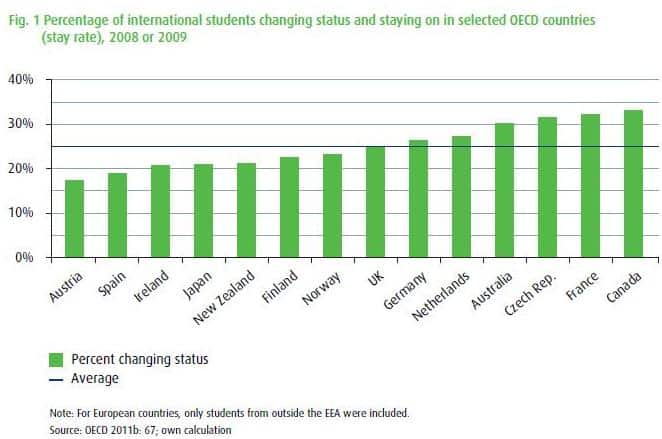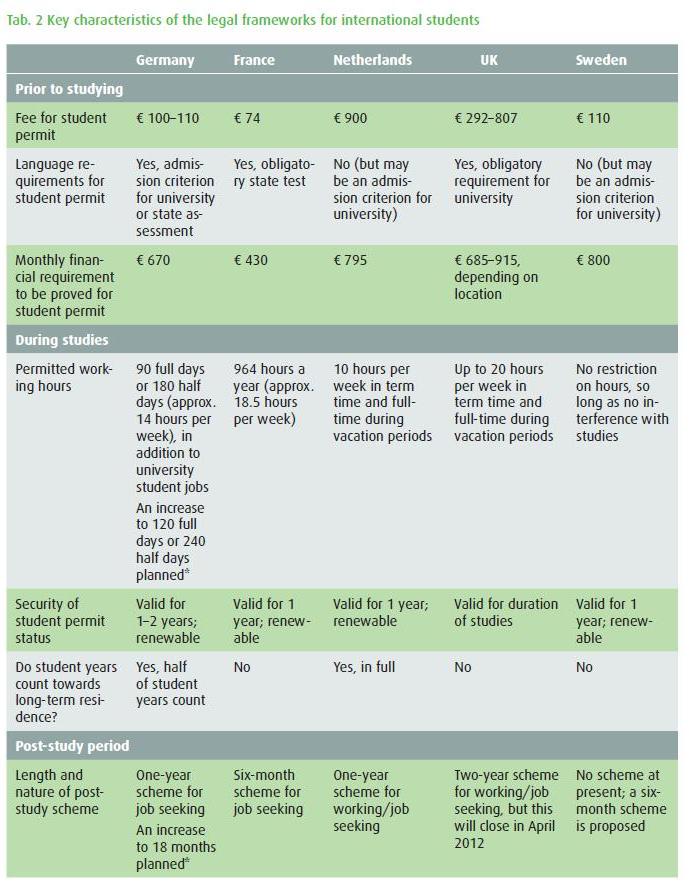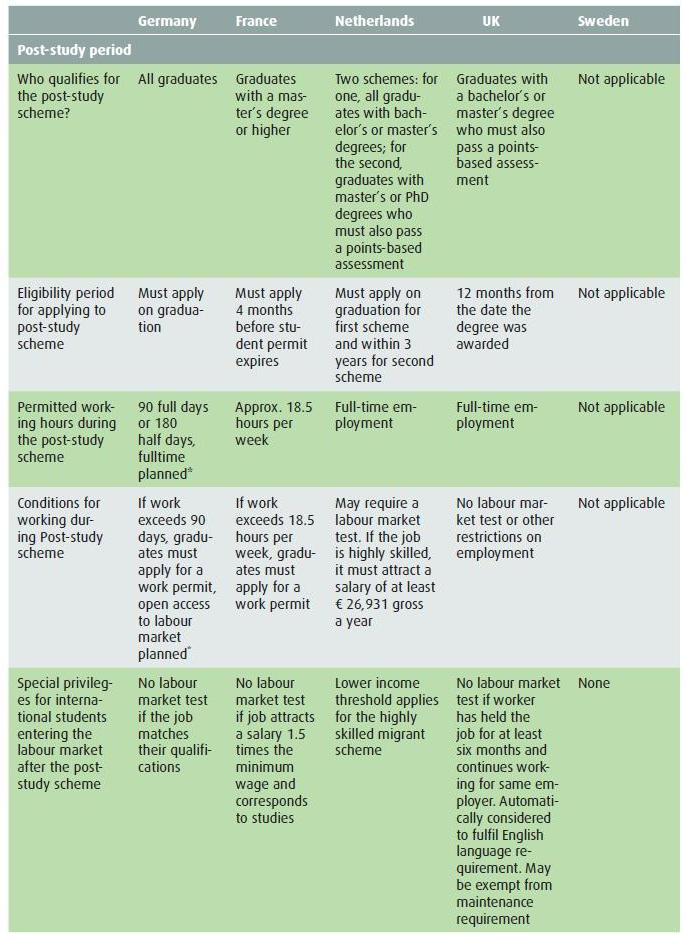European survey reveals intentions of international students, compares legislation
Yesterday we reported that Germany is easing post-study work and immigration legislation for foreign students in the wake of an interesting report based on a survey conducted by the Expert Council of German Foundations on Integration and Migration (SVR). The survey results revealed the intentions of over 6,200 international students at 25 universities in Germany, France, the United Kingdom, The Netherlands and Sweden. The survey set out to investigate three main questions:
- the propensity of international students to stay in the country of study after graduation;
- the factors motivating them to stay on or to leave;
- their knowledge and assessment of the related legal framework.
Almost two-thirds of the respondents are interested in remaining in their country of study after graduation, and plan to do so for a relatively limited time period (one to two years). However, just a quarter actually did remain in country. Employment opportunities and the desire to gain international work experience are the main reasons for wishing to stay on, supporting the idea that professional experience is increasingly regarded by students as a key aspect of the ‘study abroad package.’ Only 12.5% of the students stated that they wished to stay on for more than five years, with the majority seeking either to return home and take advantage of their new skills and experience or to go to another foreign country. While career-related factors provide the main motivation for staying on, family and personal relationships were most commonly cited as the reason for planning to leave after graduation.
Permanent migration is clearly not the intention of the bulk of respondents, as only around ten percent indicated, at this stage in their studies at least, that they plan to stay on for more than five years. International students who intended from the outset to use their study abroad experience as a stepping stone to permanent migration appear to be the exception rather than the rule.
Overall, the main tendency among respondents is the desire to stay on for a few years to gain international work experience before eventually returning to their home countries or moving elsewhere.

Student profiling
A number of characteristics are associated with the intention to stay on after graduation. Those who are interested in doing so...
- tend to be younger.
- often have prior work experience in the country of study.
- are less likely to have children.
- those pursuing degrees in science- and technology-related fields (i.e. engineering, mathematics and natural sciences) are more likely to express the desire to stay on than social science, art or humanities students.
- respondents from countries in Asia (e.g. China, India, Iran and Sri Lanka) and Eastern Europe (e.g. Ukraine and Serbia) are generally keener to stay on than those from North America, Latin America and Africa.
Those who plan to stay on also display the following characteristics:
- are better informed about the legal opportunities for prolonging their stay after graduation.
- have better local language skills.
- have higher levels of satisfaction with the study experience.
- are of the opinion that international students are welcome to stay and look for work after graduation.
Challenges international students face
The survey results indicate a problematic situation with regard to the level of knowledge on post-study work and visa options and the ease of accessing information on these topics.
- Across the board, between 37% (UK) and 45.9% (Germany) of respondents feel poorly or not at all informed about the legal opportunities for obtaining a post-study work or residence visa.
- Less than one quarter of the students in each country surveyed feel that it is easy to access such information, suggesting that there is much room for improvement in relation to the availability of clear information about international students’ post-study options.
- Respondents in the Netherlands and the UK are most aware of the existence of regulations for international students to transition to work after graduation, and respondents in these countries also find it easiest to access information on legal procedures for post-study visas.
- Respondents in Germany feel the most poorly informed about their legal options for staying on after graduation (only 14.7% feel well or very well informed) and some complained about the lack of legal information available in English and therefore the difficulty of navigating the legal framework.
Respondents’ perceptions of their employment prospects in their country of study and of the extent to which the labour market welcomes non-EU graduates are broadly positive in the Netherlands and Germany. However, respondents in France and the UK expressed frustration at recent changes in the regulations or administrative practices for international students and graduates and were less likely to agree that international students are welcome to stay and look for work after graduation compared to respondents in the other countries. Finally, an alarming percentage of international students said they had encountered discrimination or prejudice because they were foreign: in France (39.9%), Germany (39.4%), Sweden (34.9%), The Netherlands (30.1%) and the UK (27.4%).
Suggestions for improvement
Clearer or more accessible information for students is needed on the changes taking place in the UK and France, and the wider availability of information and services offered in English would be beneficial for international students in Germany. In Germany in particular, it would be worthwhile to better prepare international students for what to expect in terms of both the language competencies required for university and the labour market, and the conditions realistically needed to acquire the German language. Emerging research findings and the results of this report indicate that simply studying in a country is not sufficient to overcome many of the difficulties migrants face, such as gaps in language proficiency, acculturation and integration, visa insecurity and concerns about family migration and discrimination. Better tracking of international students in order to monitor their labour market performance, social integration and other outcomes is crucial for the development of policies and services to support the successful transition of international students from study to work. This report points to a number of opportunities for better supporting international students and graduates, and suggests that the five countries studied are not making full use of the skills and potential of their international students. Given that family and personal relationship factors were among the most important reasons cited for leaving, and as many students expressed concern about the insecurity of their status in the country, improving access to long-term residency and family reunification for international students could send a positive signal to current or prospective students. If countries are keen to encourage international students to stay on after graduation, policies on these and other issues will have to become more inclusive of students and better tailored to their needs.
Legislation comparison by country
The United Kingdom and the Netherlands apply stricter selection criteria at point of entry, and, particularly in the Dutch case, undertake more rigorous monitoring throughout the study period (e.g. educational institutions will soon need to become recognised sponsors of international students, obliged to monitor their immigration status and academic progression; employers of international students must obtain a work permit).
These countries, however, offer students comparatively more generous and flexible post-study schemes. This means that, although the selection criteria are restrictive, students can take advantage of relatively generous conditions for staying on if they successfully complete their studies. The regime will soon change in the UK, however, as the government aims to reduce net immigration numbers.
In France and Germany, on the other hand, the nature of the respective legal regimes and higher education sectors means that it is easier for students to gain entry (e.g. much lower tuition fees, no requirement for universities to act as sponsors or to register with the immigration authorities in order to host students). In terms of post-study opportunities, however, students wishing to prolong their stay after graduation are currently faced with stricter limits on working than those in the Netherlands and the UK – although changes are expected to come into effect in Germany.
In comparison with the other four countries, Sweden is a slow mover in providing legal opportunities or special regulations for international students who wish to stay on. Sweden is the only country reviewed which does not have a post-study scheme or a special scheme for highly skilled migrants in place, although if students receive a job offer before graduating they are not subject to a burdensome labour market test or ‘skilled job’ requirement.


Characteristics of the countries surveyed
Finally, a summary of key characteristics of the five countries reveals wide variations:

















